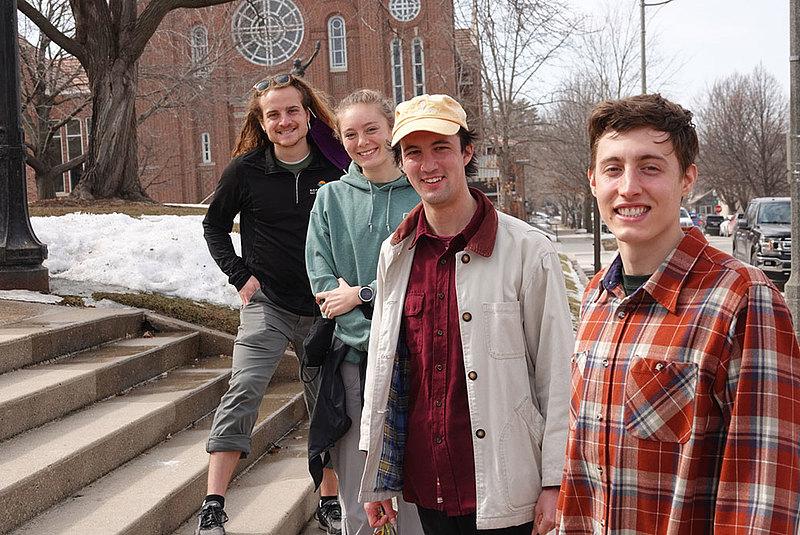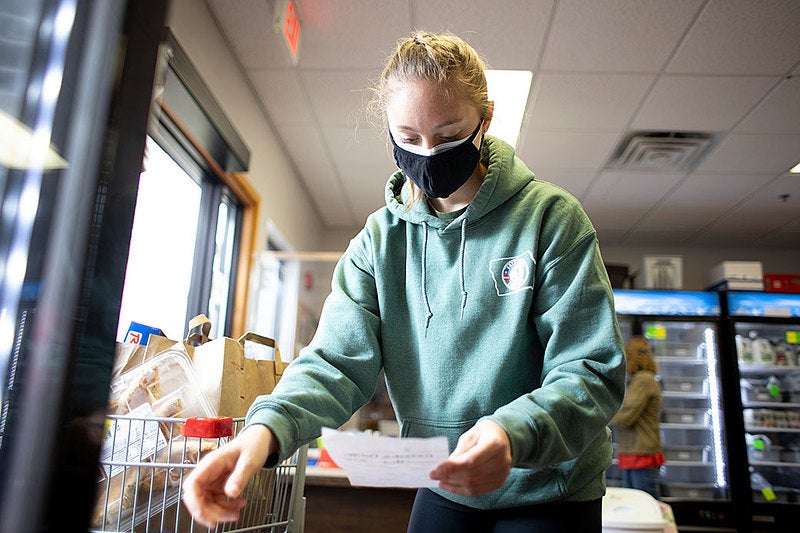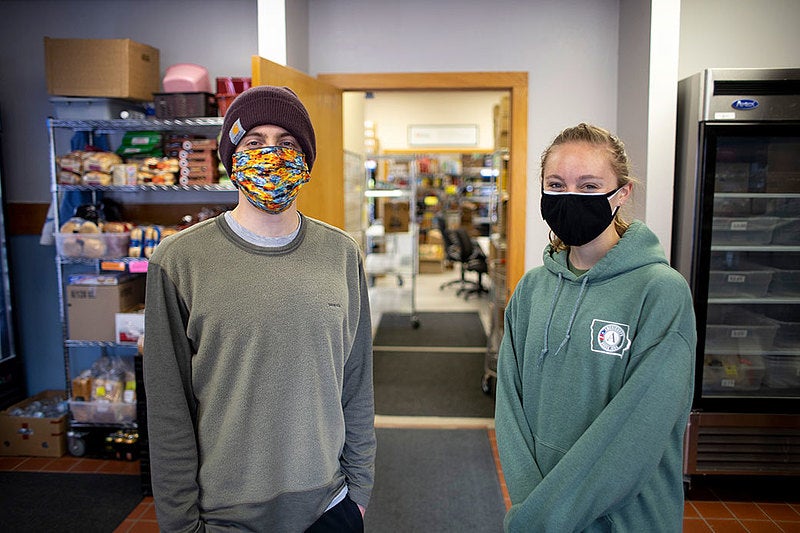Coming home, giving back
by Kristine Jepsen
It’s a bright day in March, warm enough (by student standards) for shorts and a sweatshirt, but there’s a wary chill, too, seeping from the cement Decorah courthouse steps where 2020 graduates Collin Kern (Bloomington, Minn.), Maggie Anderson (St. Peter, Minn.), Martin Donovan (Minneapolis, Minn.), and Matt Staver (Bloomington, Ill.) are perched. It’s an anniversary of sorts—of the month COVID-19 first impacted their college careers, and of the Green Iowa AmeriCorps volunteer service they each started considering as a way to get “home” to Decorah after completing their senior year away from campus, online.

Class of 2020 grads (left to right) Collin Kern, Maggie Anderson, Martin Donovan, Matt Staver, and Mara Mergens (not pictured) moved from full-time Luther students to full-fledged Decorah community members during their year as Green Iowa AmeriCorps volunteers.
“A year later, I think I’m still processing what it meant,” says Mara Mergens (St. Paul, Minn.), also a volunteer since summer 2020. Hitting eject in the culminating months of her Luther career pitched her and her classmates into a whirlwind of Wi-Fi-dependent goodbyes, then a job search in a marketplace several degrees narrower than anticipated.
But Green Iowa AmeriCorps (GIA) service offered an opportunity to bridge COVID’s uncertainty and accelerate these graduates’ interest in environmental and community stewardship. A division of the national AmeriCorps volunteer network, Green Iowa AmeriCorps “empowers Iowa’s communities and school districts to make more environmental, conservation-minded decisions and improvements through direct service work, environmental education, professional development opportunities, and volunteer engagement.”
GIA’s hub resides with the University of Northern Iowa’s Center for Energy and Environmental Education. Winneshiek Energy District, in Decorah, is a host organization for volunteers who serve 11-month terms, typically September to August. In 2020–21, two summer volunteers, Collin and Mara, stayed on to join the incoming fall cohort. This marked the first time Luther grads filled all five competitive service positions.
Energy education
In tandem with Winneshiek Energy District, Green Iowa AmeriCorps volunteers serve as coordinators of energy-related services, education, community activities, and logistics. As the resident energy coordinators, Matt and Martin spearheaded the modification of GIA’s flagship service: the home energy audit. With COVID restrictions preventing the team from entering clients’ homes to replace lightbulbs, install water-saving faucet filters, and test homes for air leaks, the GIA team developed the Bright Box—a customized box of energy-efficient LED lightbulbs to replace a home’s incandescent or compact fluorescent bulbs. Customers sign up for a Bright Box on the WED website, with costs subsidized in part for all customers, with free service for low-income residents and older citizens.
Halfway through their service term, Martin reports that Bright Boxes have saved residents of more than 80 homes nearly $13,000 in energy costs. The 2020–21 GIA team also developed Bright Box instructions and energy-efficiency information in Spanish to better serve nonnative speakers, especially in the Postville community.

During her stint as a Green Iowa AmeriCorps volunteer, Maggie Anderson orchestrated invasive buckthorn and honeysuckle removal around town and helped out at the Decorah Food Pantry.
Along the way, both Martin and Matt earned certificates in building science principles from the Building Professional Institute, part of GIA’s professional development mission. “It’s been valuable to have firsthand knowledge of energy-related issues and policies,” says Matt, who is interested in nonprofit work. Martin, who was active in the 2018 Decorah Power initiative to explore a municipal energy utility in town, as well as the development of the Decorah Sustainability Plan, sees energy as a central issue for community development. “Having an understanding of energy efficiency and how it’s becoming the social and technical norm applies in a variety of fields,” he explains.
Community engagement
As activities coordinator, Maggie orchestrated invasive buckthorn and honeysuckle removal from public spaces and Luther’s campus, as well as maintenance of the Decorah Community Butterfly Garden and seed-packing at Seed Savers Exchange. “I feel like my mental map of town is so much better!” she says. “It’s nice to feel a part of the larger community.” She and education coordinator Collin Kern, an assistant to the Luther track program, also facilitated a walking school bus for elementary children in Decorah, resulting in weeks-long volleys of “Would you rather?”
Boots-on-the-ground response
In hindsight, the team points to volunteering at the Decorah Food Pantry as the most memorable outcome of their GIA service amid COVID. When stay-at-home orders and precautions for older citizens made it unwise for the pantry’s typical staff of volunteers age 65+ to risk exposure at work, the GIA team picked up one to two shifts per person each week, helping the pantry transition to an online ordering system and touch-free pickup and delivery.
“I found myself really looking forward to working with some of the RSVP [Retired Senior Volunteer Program] folks each week,” Collin explains. “One gentleman, a retired Spanish teacher, helped us translate our materials so more people understood how to access the pantry, even as things were shifting and changing week to week to keep up with best practices under COVID.”

The five AmeriCorps volunteers served the Decorah community in ways that ranged from home energy audits to invasive buckthorn removal to seed-packing at Seed Savers Exchange. Often, Matt Staver (left) and Maggie Anderson (right) helped out at the Decorah Food Pantry.
Mara agrees: “Typically, GIA teams come from all parts of the country, but that didn’t happen for a variety of reasons this year. Instead, I found diversity I didn’t expect hearing the life experiences of senior volunteers. One woman—and she’s fairly young for a retiree! I don’t want to get in trouble for suggesting she’s older than she is!—really taught me about resilience, about accepting what you’ve been given and finding ways to continue to share your skills, to give back to the community.”
A longtime coordinator of campus recycling for Luther’s Center for Sustainable Communities, Mara continues both her GIA work and a survey of campus waste infrastructure largely from her Decorah apartment’s kitchen counter, via Zoom. “I recommend volunteer work in general. You gain experience that helps you figure out your next move. We were lucky to regain some of our time here Decorah, to be welcomed as members of the community.”